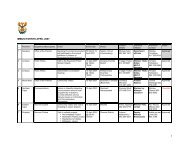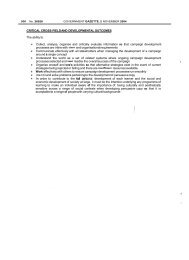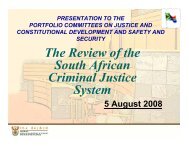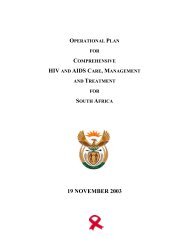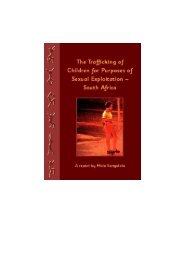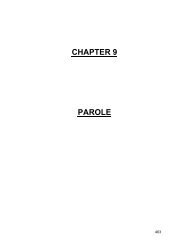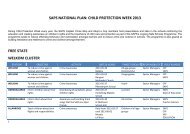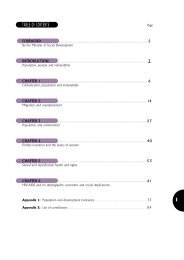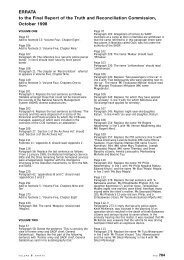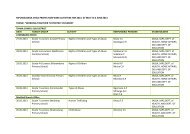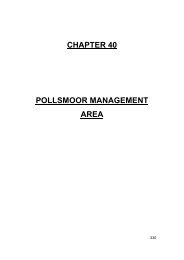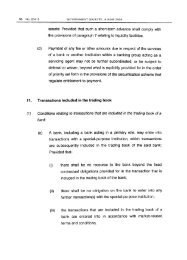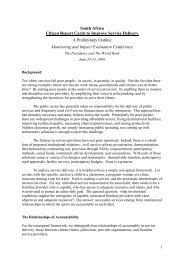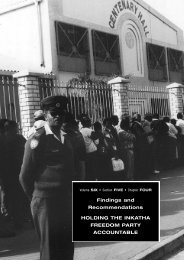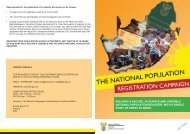Holding the ANC Accountable - South Africa Government Online
Holding the ANC Accountable - South Africa Government Online
Holding the ANC Accountable - South Africa Government Online
Create successful ePaper yourself
Turn your PDF publications into a flip-book with our unique Google optimized e-Paper software.
Vo l u m e SIX • S e c t i o n FIVE • C h ap t e r THREE<br />
Findings and<br />
R e c o m m e n d a t i o n s<br />
HOLDING THE <strong>ANC</strong><br />
A C C O U N TA B L E
Vo l u m e SIX S e c t i o n FIVE C h ap t e r T H R E E<br />
<strong>Holding</strong> <strong>the</strong> <strong>ANC</strong><br />
A c c o u n t a b l e<br />
■<br />
I N T R O D U C T I O N<br />
1. In its five-volume Final Report, <strong>the</strong> Truth and Reconciliation Commission (<strong>the</strong><br />
Commission) fully endorsed <strong>the</strong> international law position that apar<strong>the</strong>id was a<br />
crime against humanity. It also recognised that both <strong>the</strong> <strong>Africa</strong>n National<br />
C o n g ress (<strong>ANC</strong>) and <strong>the</strong> Pan <strong>Africa</strong>nist Congress (PAC) were intern a t i o n a l l y<br />
recognised liberation movements that conducted a legitimate struggle against<br />
<strong>the</strong> former <strong>South</strong> <strong>Africa</strong>n government and its policy of apar<strong>the</strong>id.<br />
2. The Commission noted that <strong>the</strong> <strong>ANC</strong> made submissions to <strong>the</strong> Commission,<br />
including handing over a report on internal inquiries it had conducted in exile. It<br />
is important to restate that <strong>the</strong> <strong>ANC</strong> was, in all respects, more frank and cooperative<br />
with <strong>the</strong> Commission than ei<strong>the</strong>r <strong>the</strong> state or <strong>the</strong> PA C .<br />
FINDINGS<br />
3. The Commission noted that, of <strong>the</strong> three main parties to <strong>the</strong> conflict, only <strong>the</strong><br />
<strong>ANC</strong> committed itself to observing <strong>the</strong> tenets of <strong>the</strong> Geneva Protocols and, in<br />
<strong>the</strong> main, conducting <strong>the</strong> armed struggle in accordance with intern a t i o n a l<br />
humanitarian law. This report acknowledges <strong>the</strong> commitment of <strong>the</strong> <strong>ANC</strong> to<br />
upholding <strong>the</strong> Geneva Protocols as well as its comparative restraint in conducting<br />
<strong>the</strong> armed struggle – at least in terms of <strong>the</strong> manner in which it identified its<br />
t a rgets and its leadership’s decision to instruct its cadres to abandon <strong>the</strong> landmine<br />
campaign when it became clear that it was resulting in <strong>the</strong> deaths and<br />
injuries of innocent civilians.<br />
4. H o w e v e r, <strong>the</strong> Commission drew a distinction between <strong>the</strong> conduct of a ‘just<br />
war’ and <strong>the</strong> question of ‘just means’. The Commission found that, whilst its<br />
struggle was just, <strong>the</strong> <strong>ANC</strong> had, in <strong>the</strong> course of <strong>the</strong> conflict, contravened <strong>the</strong><br />
Geneva Protocols and was responsible for <strong>the</strong> commission of gross human<br />
rights violations. For this reason <strong>the</strong> Commission held that <strong>the</strong> <strong>ANC</strong> and its<br />
o rgans – <strong>the</strong> National Executive Council (NEC), <strong>the</strong> Secretariat and its armed<br />
wing Umkhonto we Sizwe (MK) – had, in <strong>the</strong> course of <strong>the</strong>ir political activities<br />
V O L U M E 6 S E C T I O N 5 C H A P T E R 3 P A G E 6 4 2
and in <strong>the</strong> conduct of <strong>the</strong> armed struggle, committed gross human rights<br />
violations for which <strong>the</strong>y are morally and politically accountable.<br />
THE POSITION AFTER THE HANDING OVER OF THE FINAL REPORT<br />
5. As mentioned above, <strong>the</strong> Commission wishes to place on re c o rd that it sought<br />
in its findings to draw a distinction between a ‘just war’ and ‘just means’. It did<br />
not criminalise <strong>the</strong> struggle. It was, however, obliged in terms of its mandate set<br />
out in its founding Act 56 to determine <strong>the</strong> question of responsibility for <strong>the</strong><br />
commission of gross human rights violations.<br />
6. On <strong>the</strong> eve of handing over its Final Report, <strong>the</strong> <strong>ANC</strong> sought to interdict <strong>the</strong><br />
Commission from doing so. The essence of <strong>the</strong> application was to challenge <strong>the</strong><br />
C o m m i s s i o n ’s interpretation of <strong>the</strong> audi alterem partem rule and to compel <strong>the</strong><br />
Commission to meet with it to discuss <strong>the</strong> proposed findings. This court challenge<br />
is dealt with in Section One, Chapter Four of this volume. The High Court of <strong>the</strong><br />
We s t e rn Cape found against <strong>the</strong> <strong>ANC</strong>, <strong>the</strong>reby allowing <strong>the</strong> Commission to hand<br />
its report over to President Mandela. There was, however, a great deal of acrimony<br />
between <strong>the</strong> Commission and <strong>the</strong> <strong>ANC</strong> about <strong>the</strong> findings made. Yet <strong>the</strong> fact is<br />
that <strong>the</strong> Commission said nothing that had not already been brought to <strong>the</strong><br />
Commission by <strong>the</strong> <strong>ANC</strong> itself. It was indeed <strong>the</strong> <strong>ANC</strong>’s disclosures and<br />
acknowledgment that gross human rights violations had been committed in <strong>the</strong><br />
conduct of <strong>the</strong> struggle that assisted <strong>the</strong> Commission in coming to its conclusions.<br />
7. In February 1999, at a sitting of both houses of parliament convened to discuss<br />
<strong>the</strong> Report, Deputy President Thabo Mbeki reiterated his complaint that <strong>the</strong><br />
<strong>ANC</strong> had not been able to meet with <strong>the</strong> Commission to discuss its findings<br />
against <strong>the</strong> <strong>ANC</strong>. He made <strong>the</strong> following statement:<br />
What we had sought to discuss with <strong>the</strong> TRC pertained to such obviously<br />
important matters as <strong>the</strong> definition of <strong>the</strong> concept of gross violations of human<br />
rights in <strong>the</strong> context of a war situation and o<strong>the</strong>r issues relating to war and<br />
peace and <strong>the</strong> humane conduct of warfare. One of <strong>the</strong> central matters at issue<br />
was, and remains, <strong>the</strong> erroneous determination of various actions of our liberat i o n<br />
movement as gross violations of human rights, including <strong>the</strong> general implication<br />
that any and all military activity which results in <strong>the</strong> loss of civilian lives constitutes<br />
a gross violation of human rights. Indeed, it could also be said that <strong>the</strong> erroneous<br />
56 The Promotion of National Unity and Reconciliation Act No. 34 of 1995, (<strong>the</strong> A c t ) .<br />
V O L U M E 6 S E C T I O N 5 C H A P T E R 3 P A G E 6 4 3
logic followed by <strong>the</strong> TRC, which was contrary even to <strong>the</strong> Geneva Conventions<br />
and Protocols governing <strong>the</strong> conduct of warfare, would result in <strong>the</strong> characterisation<br />
of all irregular wars of liberation as tantamount to a gross violation of<br />
human rights. We cannot accept such a conclusion 57 .<br />
8. The Commission is not re q u i red to respond to criticism of its findings by <strong>the</strong><br />
<strong>ANC</strong> and o<strong>the</strong>r critics. However, at <strong>the</strong> time that <strong>the</strong> findings of responsibility were<br />
made, <strong>the</strong> work of <strong>the</strong> Amnesty Committee was not complete and <strong>the</strong>re was some<br />
expectation that <strong>the</strong> Commission would re-examine <strong>the</strong>se findings in <strong>the</strong> light of <strong>the</strong><br />
amnesty decisions and <strong>the</strong> evidence received through this process. In doing so, it<br />
is necessary to deal with both international law and international humanitarian law.<br />
I N T E R N ATIONAL HUMANITARIAN LAW<br />
9. The Geneva Conventions were adopted in 1949 and <strong>South</strong> <strong>Africa</strong> acceded to<br />
<strong>the</strong>m in 1952. In 1977, additional Protocols I and II were adopted. In 1980, <strong>the</strong><br />
<strong>ANC</strong> deposited a declaration with <strong>the</strong> President of <strong>the</strong> International Committee<br />
of <strong>the</strong> Red Cross (ICRC) committing <strong>the</strong> <strong>ANC</strong> to international humanitarian law. 58<br />
10. The principles of international humanitarian law that apply to <strong>the</strong> situation in<br />
<strong>South</strong> <strong>Africa</strong> are set out in Chapter One of this section. The chapter also deals<br />
with <strong>the</strong> <strong>ANC</strong>’s declaration that it would govern <strong>the</strong> conduct of its struggle in<br />
a c c o rdance with international humanitarian law.<br />
Moral equivalence<br />
11. One of <strong>the</strong> criticisms <strong>the</strong> <strong>ANC</strong> levelled at <strong>the</strong> Commission was that of ‘moral<br />
equivalence’. The <strong>ANC</strong> claimed that <strong>the</strong> Commission equated <strong>the</strong> actions of<br />
those who fought a just cause against apar<strong>the</strong>id with those who fought in<br />
defence of an unjust cause.<br />
12. The Commission’s position has always been 59 that it was obliged by statute to<br />
deal even-handedly with all victims. Its actions in this respect were guided,<br />
amongst o<strong>the</strong>r things, by <strong>the</strong> principle that victims should be treated equally,<br />
without discrimination of any kind. Despite this, however, <strong>the</strong> Commission did<br />
not suspend moral judgment and drew a distinction between <strong>the</strong> actions of <strong>the</strong><br />
state and those of <strong>the</strong> liberation movements.<br />
57 Hansard: Feb 5–March 26 1999.<br />
58 See <strong>the</strong> Appendix to this ch a p t e r.<br />
59 See Volume One.<br />
V O L U M E 6 S E C T I O N 5 C H A P T E R 3 P A G E 6 4 4
13. When dealing with <strong>the</strong> question of even-handedness and moral equivalence<br />
(whe<strong>the</strong>r making its findings against <strong>the</strong> state, <strong>the</strong> liberation movements or<br />
o<strong>the</strong>r parties), <strong>the</strong> Commission relied on internationally accepted human rights<br />
principles. In order to arrive at a definition of a gross human rights violation, <strong>the</strong><br />
Commission relied on <strong>the</strong> definition contained in <strong>the</strong> Act and, in making its<br />
assessment, took into account <strong>the</strong> political context and <strong>the</strong> circumstances within<br />
which <strong>the</strong> violation had taken place.<br />
14. This did not, however, mean that <strong>the</strong> Commission treated <strong>the</strong> conflict as a<br />
conflict between equal parties. The Commission recognised that <strong>the</strong> might of<br />
<strong>the</strong> state, with all its power and legitimacy (however ill-conferred) was in a far<br />
s t ronger position than were <strong>the</strong> liberation movements.<br />
15. The Commission also never characterised <strong>the</strong> war that <strong>the</strong> former state waged<br />
against its own people as ei<strong>the</strong>r morally or legally justified.<br />
16. The Commission also took care not to use apar<strong>the</strong>id definitions of legal conduct.<br />
IUS IN BELLO A N D IUS AD BELLUM<br />
17. The <strong>ANC</strong> also criticised <strong>the</strong> Commission for failing to deal adequately with <strong>the</strong><br />
fact that <strong>the</strong> apar<strong>the</strong>id state acted in breach of <strong>the</strong> Geneva Conventions and <strong>the</strong><br />
Additional Protocols. According to this view, <strong>the</strong> actions that <strong>the</strong> state considere d<br />
to be legitimate were war crimes. For this reason it is important to elucidate <strong>the</strong><br />
distinction between a ‘just war’ and ‘just means’.<br />
18. In its five-volume Final Report, <strong>the</strong> Commission stated <strong>the</strong> following:<br />
The application of some of <strong>the</strong> principles and criteria of just war <strong>the</strong>ory have<br />
proved difficult and controversial, especially when dealing with unconventional<br />
wars, that is wars of national liberation, civil wars and guerrilla wars within states.<br />
The distinction between means and cause is a dimension of just war <strong>the</strong>ory that<br />
cannot be ignored. Often this distinction is made in terms of justice in war (ius<br />
in bello) and justice of war (ius ad bellum).<br />
19. In dealing with <strong>the</strong> doctrine of justice in war, <strong>the</strong> Commission stated:<br />
T h e re are limits to how much force may be used in a particular context and<br />
restrictions on who or what may be targeted. Two principles dominate this body<br />
of law:<br />
V O L U M E 6 S E C T I O N 5 C H A P T E R 3 P A G E 6 4 5
The use of force must be reasonably tailored to a legitimate military end;<br />
Certain individuals are entitled to specific protection, making a fundamental<br />
distinction between combatants and non-combatants. Thus even an enemy<br />
soldier who is armed and ready for combat may be harmed and even killed, but<br />
a civilian or a sick, wounded or captured soldiers may not be harmed.<br />
20. The Report stated fur<strong>the</strong>r:<br />
The Commission’s confirmation that <strong>the</strong> apar<strong>the</strong>id system was a crime against<br />
humanity does not mean that all acts carried out in order to destroy apar<strong>the</strong>id<br />
was necessarily legal, moral and acceptable. The Commission with <strong>the</strong> international<br />
consensus that those who were fighting for a just cause were under an<br />
obligation to employ just means in <strong>the</strong> conduct of this fight.<br />
As far as justice in war is concerned, <strong>the</strong> framework within which <strong>the</strong> Commission<br />
made its findings was in accordance with international law and <strong>the</strong> views and<br />
findings of international organisations and judicial bodies. The strict prohibitions<br />
against torture and abduction and <strong>the</strong> grave breach of killing and injuring<br />
defenceless people, civilians and soldiers ‘hors de combat’ re q u i red <strong>the</strong><br />
Commission to conclude that not all actions in war could be regarded as morally<br />
or legally legitimate, even where <strong>the</strong> cause was just.<br />
21. Given <strong>the</strong> <strong>ANC</strong>’s own commitment to upholding <strong>the</strong> Geneva Conventions and<br />
<strong>the</strong> various principles of international humanitarian law – as well as its own<br />
Declaration in 1980 – it is difficult to understand why it wishes to pursue this<br />
a rgument. The Commission, however, stands by this distinction. Hans-Peter<br />
G a s s e r, a former Senior Legal Adviser to <strong>the</strong> ICRC has stated:<br />
The rules of international law apply to all armed conflicts, irrespective of <strong>the</strong>ir<br />
origin or cause. They have to be respected in all circumstances and with re g a r d<br />
to all persons protected by <strong>the</strong>m, without any discrimination. In modern humanitarian<br />
law, <strong>the</strong>re is no place for discriminatory treatment of victims of warfare<br />
based on <strong>the</strong> concept of ‘just war’.<br />
22. P rofessor Kader Asmal, a member of <strong>the</strong> <strong>ANC</strong> National Executive and a leading<br />
expert in international law, explained <strong>the</strong> <strong>ANC</strong>’s commitment to <strong>the</strong> Geneva<br />
Conventions as follows:<br />
The applicability of <strong>the</strong> humanitarian rules of war to conflicts between an incumbent<br />
state and a national liberation movement fighting for self-determination is<br />
V O L U M E 6 S E C T I O N 5 C H A P T E R 3 P A G E 6 4 6
clearly accepted. The Protocols to <strong>the</strong> 1977 Geneva Conventions are intended<br />
to apply to such a conflict and were subscribed to by <strong>the</strong> <strong>ANC</strong> in 1980. Although<br />
<strong>the</strong> Apar<strong>the</strong>id state did not ratify <strong>the</strong> relevant Protocol, that Protocol mere l y<br />
codified pre-existing contemporary law on <strong>the</strong> subject. Thus both belligerents in<br />
<strong>South</strong> <strong>Africa</strong> were under an obligation to treat <strong>the</strong> conflict as one governed by<br />
<strong>the</strong> law of war. Under Article 85, paragraph 5 of <strong>the</strong> Geneva Protocol,’ grave<br />
b reaches’ of <strong>the</strong> Convention and Protocol constitute war crimes. 60<br />
23. The report of <strong>the</strong> Motsuenyane Commission on conditions in <strong>the</strong> <strong>ANC</strong> camps in<br />
Angola spelt out <strong>the</strong> <strong>ANC</strong>’s obligations under international humanitarian law, as<br />
well as <strong>the</strong> applicability of Article 75 of Protocol I of 1977 and Common Article<br />
3 of <strong>the</strong> Geneva Conventions on <strong>the</strong> conditions and treatment of MK prisoners<br />
in <strong>the</strong>ir custody. The Motsuenyane Commission also re f e r red to <strong>the</strong> <strong>Africa</strong>n<br />
Charter on Human and People’s Rights and <strong>the</strong> International Covenant on Civil<br />
and Political Rights. This report was accepted by <strong>the</strong> <strong>ANC</strong> and its findings were<br />
re f e r red to <strong>the</strong> Commission.<br />
24. Thus a just cause cannot mean that all restraint in <strong>the</strong> conduct of <strong>the</strong> war<br />
should be allowed to fall away. Although <strong>the</strong> cause of <strong>the</strong> liberation movements<br />
amounted to a just war, certain incidents that impacted on those who were h o r s<br />
de combat and ‘civilians’ were considered to be breaches of international law. A<br />
number of incidents involving indiscriminate bombings that led to <strong>the</strong> injury and<br />
death of civilians are re g a rded in law as breaches, <strong>the</strong> responsibility for which<br />
<strong>the</strong> group or movement that committed <strong>the</strong>se acts must acknowledge.<br />
25. This debate is a crucial one in modern times as <strong>the</strong> distinction between<br />
‘ f reedom fighter’ and ‘terrorist’ becomes more blurred.<br />
26. Again, <strong>the</strong> principle that derives is that <strong>the</strong> fact that <strong>the</strong> liberation movements’<br />
cause was just does not mean that <strong>the</strong>y were not re q u i red to act justly in <strong>the</strong> conduct<br />
of that war. Thus <strong>the</strong> ius in bello cannot be separated from <strong>the</strong> ius ad bellum.<br />
27. In essence, <strong>the</strong> effect of this distinction is to hold individuals, organisations,<br />
states and organs of <strong>the</strong> state accountable for <strong>the</strong>ir actions. Thus military commanders<br />
cannot evade <strong>the</strong> consequences of <strong>the</strong>ir orders; nor can subord i n a t e s<br />
evade punishment or accountability on <strong>the</strong> basis of having followed orders. The<br />
60 A s m a l ,K , Asmal L, and Roberts, R S, Reconciliation through Tr u t h : A Reckoning of Apar<strong>the</strong>id's Criminal<br />
G o v e r n a n c e. Cape To w n , David Phillip, 1 9 9 6 .<br />
V O L U M E 6 S E C T I O N 5 C H A P T E R 3 P A G E 6 4 7
esponsibility to act within <strong>the</strong> boundaries of international humanitarian law binds<br />
all actors, both state and non-state parties. According to Professor Kader Asmal:<br />
Tr a d i t i o n a l l y, <strong>the</strong>se two branches of international law have addressed separate<br />
issues: international humanitarian law has been concerned with <strong>the</strong> treatment of<br />
combatants and non-combatants by <strong>the</strong>ir opponents in wartime, while international<br />
human rights law has been concerned with <strong>the</strong> relationship between<br />
states and <strong>the</strong>ir own national son peacetime. Yet, even in earlier times, <strong>the</strong>y<br />
s h a red a fundamental concern: a commitment to human dignity and welfare ,<br />
i r respective of <strong>the</strong> status of <strong>the</strong> individual (combatant or non-combatant) and of<br />
<strong>the</strong> circumstances under which his rights and responsibilities are to be exercised<br />
(peacetime or wartime) 61 .<br />
SPECIFIC FINDINGS<br />
28. The Commission made its findings based, in <strong>the</strong> main, on frank and substantial<br />
submissions by <strong>the</strong> <strong>ANC</strong> and <strong>the</strong> testimony of both <strong>the</strong> political and military<br />
leadership at public hearings. In addition, <strong>the</strong> Commission took into account <strong>the</strong><br />
statements of victims and testimony received from amnesty applicants and<br />
during section 29 hearings.<br />
29. The Commission stated that:<br />
The <strong>ANC</strong> has accepted responsibility for all actions committed by members of<br />
MK under its command in <strong>the</strong> period 1961 to august 1990. In this period <strong>the</strong>re<br />
w e re a number of such actions – in particular <strong>the</strong> placing of limpet and landmines<br />
– which resulted in civilian casualties. Whatever <strong>the</strong> justification given by<br />
<strong>the</strong> <strong>ANC</strong> for such acts – misinterpretation of policy, poor surveillance, anger or<br />
differing interpretations of what constituted a ‘legitimate military target’ – <strong>the</strong><br />
people who were killed or injured by such explosions are all victims of gross<br />
human rights violations of human rights perpetrated by <strong>the</strong> <strong>ANC</strong>. While it is<br />
accepted that targeting civilians was not <strong>ANC</strong> policy, MK operations none<strong>the</strong>less<br />
ended up killing fewer security force members than civilians.<br />
61 Ibid.<br />
V O L U M E 6 S E C T I O N 5 C H A P T E R 3 P A G E 6 4 8
30. With respect to <strong>the</strong> actions of MK during <strong>the</strong> armed struggle, <strong>the</strong> Commission<br />
found that:<br />
Whilst it was <strong>ANC</strong> policy that <strong>the</strong> loss of civilian life should be avoided, <strong>the</strong>re<br />
w e re instances where members of MK perpetrated gross violations of human<br />
rights in that <strong>the</strong> distinction between military and civilian targets was blurred in<br />
certain armed actions, such as <strong>the</strong> 1983 Church street bombing of <strong>the</strong> SAAF<br />
headquarters, resulting in gross violations of human rights through civilian injury<br />
and loss of life.<br />
In <strong>the</strong> course of <strong>the</strong> armed struggle <strong>the</strong>re were instances where members of MK<br />
conducted unplanned military operations using <strong>the</strong>ir own discretion, and, without<br />
adequate control and supervision at an operational level, determined targets<br />
for attack outside of official policy guidelines. While recognising that such operations<br />
were frequently undertaken in retaliation for raids by <strong>the</strong> former <strong>South</strong><br />
<strong>Africa</strong>n <strong>Government</strong> into neighbouring countries, such unplanned operations<br />
none<strong>the</strong>less often resulted in loss of life, amounting to gross violations of human<br />
rights. The 1985 Amanzimtoti shopping centre bombing is regarded by <strong>the</strong><br />
Commission in this light.<br />
In <strong>the</strong> course of <strong>the</strong> armed struggle <strong>the</strong> <strong>ANC</strong> through MK planned and undertook<br />
military operations which, though intended for military or security force<br />
targets sometimes went awry for a variety of reasons, including poor intelligence<br />
and reconnaissance. The consequences in <strong>the</strong>se cases, such as <strong>the</strong> Magoo Bar<br />
incident and <strong>the</strong> Durban esplanade bombings were gross violations of human<br />
rights in respect of <strong>the</strong> injuries to and loss of lives of civilians.<br />
While <strong>the</strong> Commission acknowledges <strong>the</strong> <strong>ANC</strong>’s submission that <strong>the</strong> form e r<br />
<strong>South</strong> <strong>Africa</strong>n government had itself by <strong>the</strong> mid-1980’s blurred <strong>the</strong> distinction<br />
between military and ‘soft’ targets by declaring border areas ‘military zones’<br />
w h e re farmers were trained and equipped to operate as an extension of military<br />
s t r u c t u res, it finds that <strong>the</strong> <strong>ANC</strong>’s landmine campaigns in <strong>the</strong> period 1985 –1987<br />
in <strong>the</strong> rural areas of <strong>the</strong> Nor<strong>the</strong>rn and Eastern Transvaal cannot be condoned, in<br />
that it resulted in gross violations of <strong>the</strong> human rights of civilians including farm<br />
l a b o u rers and children, who were killed or injured, The <strong>ANC</strong> is held accountable<br />
for such gross human rights violations.<br />
Individuals who defected to <strong>the</strong> state and became informers and/or members<br />
who became state witnesses in political trials and/or became Askaris were often<br />
labelled by <strong>the</strong> <strong>ANC</strong> as collaborators and regarded as legitimate targets to be<br />
killed. The Commission does not condone <strong>the</strong> legitimisation of such individuals<br />
as military targets and finds that <strong>the</strong> extra-judicial killings of such individuals<br />
constituted gross violations of human rights.<br />
V O L U M E 6 S E C T I O N 5 C H A P T E R 3 P A G E 6 4 9
The Commission finds that, in <strong>the</strong> 1980’s in particular, a number of gross violations<br />
of human rights were perpetrated not by direct members of <strong>the</strong> <strong>ANC</strong> or those<br />
operating under its formal command but by civilians who saw <strong>the</strong>mselves as<br />
<strong>ANC</strong> supporters. In this regard, <strong>the</strong> Commission finds that <strong>the</strong> <strong>ANC</strong> is morally<br />
and politically accountable for creating a climate in which such supporters<br />
believed <strong>the</strong>ir actions to be legitimate and carried out within <strong>the</strong> broad<br />
parameters of a ‘people’s war’ as enunciated by <strong>the</strong> <strong>ANC</strong>.<br />
31. If <strong>the</strong>se findings are analysed, it can be seen that <strong>the</strong>y fall into <strong>the</strong> following<br />
c a t e g o r i e s :<br />
a attacks ostensibly on military targets but where civilians are killed and<br />
i n j u re d ;<br />
b unplanned and indiscriminate attacks on targets outside of official policy<br />
guidelines and which affect civilians;<br />
c planned military operations that go wrong and where civilians are killed;<br />
d <strong>the</strong> deliberate targeting of individuals labelled as traitors;<br />
e attacks carried out by MK on both military and civilian targets, and<br />
f attacks carried out by supporters of <strong>the</strong> <strong>ANC</strong>. In this re g a rd, actions by UDF<br />
supporters and <strong>the</strong> SDUs are pertinent.<br />
32. If one examines each of <strong>the</strong>se categories in terms of <strong>the</strong> Geneva Conventions<br />
and Protocol I 62 , <strong>the</strong>y are clearly defined as grave bre a c h e s .<br />
a Articles 50, 51, 130 and 147 specify <strong>the</strong> following grave breaches of <strong>the</strong><br />
four Geneva Conventions respectively: wilful killing; torture or inhuman<br />
t reatment; biological experiments; wilfully causing great suffering; causing<br />
serious injury to body or health, and extensive destruction and<br />
a p p ropriation of property not justified by military necessity and carried out<br />
unlawfully and wantonly.<br />
b The following are considered to be grave breaches in terms of Articles 130<br />
and 147 of <strong>the</strong> third and fourth Geneva Conventions: compelling a prisoner<br />
of war or a protected civilian to serve in <strong>the</strong> armed forces of <strong>the</strong> hostile<br />
p o w e r, and wilfully depriving a prisoner of war or a protected person of <strong>the</strong><br />
rights of fair and regular trial prescribed in <strong>the</strong> conventions.<br />
c The following are considered to be grave breaches of <strong>the</strong> fourth Geneva<br />
Convention in terms of Article 147: unlawful deportation or transfer;<br />
unlawful confinement of a protected person, and taking of hostages.<br />
62 See Appendix 2 to Chapter One of this section.<br />
V O L U M E 6 S E C T I O N 5 C H A P T E R 3 P A G E 6 5 0
d<br />
Articles 11 and 85 of Protocol I specify what constitutes a grave breach. For<br />
our purposes, <strong>the</strong> following acts, when committed wilfully and if <strong>the</strong>y cause<br />
death or serious injury to body and health constitute grave breaches:<br />
making <strong>the</strong> civilian population or individual civilians <strong>the</strong> object of attack;<br />
launching an indiscriminate attack affecting <strong>the</strong> civilian population or civilian<br />
objects in <strong>the</strong> knowledge that such attack will cause excessive loss of life,<br />
injury to civilians or damage to civilian objects; launching an attack against<br />
works or installations containing dangerous forces in <strong>the</strong> knowledge that<br />
such attack will cause excessive loss of life, injury to civilians or damage<br />
civilian objects; making non-defended localities and demilitarised zones <strong>the</strong><br />
object of attack; making a person <strong>the</strong> object of an attack in <strong>the</strong> knowledge<br />
that he is hors de combat, and depriving a person protected by <strong>the</strong><br />
Conventions or by Protocol I of <strong>the</strong> rights of a fair and regular trial.<br />
33. An analysis of <strong>the</strong> information received by <strong>the</strong> Commission confirms that <strong>the</strong>re<br />
w e re no actions of note taken by MK inside <strong>South</strong> <strong>Africa</strong> during <strong>the</strong> period 1964<br />
to 1975.<br />
34. The period 1976 to 1984, however, saw a steady rise in <strong>the</strong> number of armed<br />
attacks. The Commission re c o rded a total of 265 incidents in this re g a rd.<br />
35. Ano<strong>the</strong>r notable feature of this period are attacks on police stations and police<br />
o fficers, who were deemed to be collaborators and were <strong>the</strong>re f o re seen as legitimate<br />
targets for execution.<br />
36. David Simelane and Obed Masina, for example, were granted amnesty for <strong>the</strong><br />
killing of Sergeant Orphan Hlubi Chapi outside his Soweto home in June 1978.<br />
It was, however, <strong>the</strong> formation of <strong>the</strong> <strong>ANC</strong> Special Operations Unit in 1979 that<br />
led to <strong>the</strong> launch of several high-profile attacks on police stations, state infras<br />
t r u c t u re and a major attack on SADF personnel, namely <strong>the</strong> Church Stre e t<br />
bombing. Here a car bomb placed outside <strong>the</strong> <strong>South</strong> <strong>Africa</strong>n Air Force headquarters<br />
in Pretoria led to <strong>the</strong> deaths of nineteen people. In terms of <strong>the</strong> numbers<br />
of casualties, this was <strong>the</strong> most devastating attack by MK in its entire history.<br />
The Commission received amnesty applications for a total of seventy-nine<br />
incidents carried out by this unit during this period. 63<br />
63 See Section Th r e e, Chapter Two in this volume.<br />
V O L U M E 6 S E C T I O N 5 C H A P T E R 3 P A G E 6 5 1
37. The amnesty applications reveal that, whilst orders were given in certain cases,<br />
t a rgets were for <strong>the</strong> most part selected by <strong>the</strong> unit in question. For example, Mr<br />
Maake, a member of <strong>the</strong> Nchabaleng unit which operated around Kwandabele,<br />
was responsible for <strong>the</strong> death of a local police off i c e r. Maake testified at his<br />
amnesty hearing that decisions about specific operations were taken by <strong>the</strong> unit<br />
itself. Mr Shoke, a member of ano<strong>the</strong>r unit, testified that:<br />
What you must understand that guerrillas as opposed in fact to conventional forces,<br />
we exercise what we call command initiative, you rely on <strong>the</strong> initiative of <strong>the</strong><br />
individual and everybody in MK was being pre p a red in fact to become a Commander.<br />
38. Whilst some units testified to <strong>the</strong> fact that decisions were taken by consensus,<br />
t h e re is no doubt that that a number of civilians were killed because of <strong>the</strong><br />
individualised nature of target selection. In addition, assassinations fre q u e n t l y<br />
t a rgeted police officers or individuals perceived to be collaborators with <strong>the</strong><br />
former state. For example, <strong>the</strong> members of <strong>the</strong> elimination unit (‘Icing Unit’)<br />
engaged in six operations, including three assassinations, before <strong>the</strong>y were<br />
caught in September 1986.<br />
39. Evidence before <strong>the</strong> Commission in respect of targets indicates that attacks<br />
w e re aimed primarily at <strong>the</strong> state and its organs and those who were branded<br />
as collaborators, and that it was not <strong>ANC</strong> policy to engage in operations that<br />
deliberately targeted civilians. In his amnesty hearing, Aboobaker Ismail testified<br />
as follows:<br />
We never set out deliberately to attack civilian targets. We followed <strong>the</strong> political<br />
objectives of <strong>the</strong> <strong>Africa</strong>n National Congress in <strong>the</strong> course of a just struggle.<br />
However in <strong>the</strong> course of a war, life is lost, and <strong>the</strong> injury to and <strong>the</strong> loss of life<br />
of innocent civilians becomes inevitable. The challenge before us was to avoid<br />
indiscriminate killing and to focus on security forces.<br />
40. Yet, despite <strong>the</strong> stated intentions and <strong>the</strong> clear policy of <strong>the</strong> <strong>ANC</strong> with re g a rd to<br />
<strong>the</strong> selection of targets, <strong>the</strong> majority of <strong>the</strong>se casualties were civilians.<br />
41. Ano<strong>the</strong>r facet of MK operations was <strong>the</strong> targeting of those re g a rded as<br />
collaborators. These included police officers, <strong>the</strong>ir family members, councillors,<br />
state witnesses in trials, and suspected informers. In terms of <strong>the</strong> Geneva Conventions<br />
and Protocol I to <strong>the</strong> Conventions, all of <strong>the</strong>se killings are re g a rded as grave<br />
b reaches and <strong>the</strong>re f o re constitute ‘war crimes’ in terms of <strong>the</strong> definitions.<br />
V O L U M E 6 S E C T I O N 5 C H A P T E R 3 P A G E 6 5 2
42. In <strong>the</strong> submission made by <strong>the</strong> <strong>ANC</strong> to <strong>the</strong> Commission in response to its<br />
findings, <strong>the</strong> <strong>ANC</strong> made it clear that <strong>the</strong>y re g a rded spies as legitimate targ e t s<br />
for killings. In addition, <strong>the</strong>y raised <strong>the</strong> fact that civilians killed in <strong>the</strong> course of<br />
attacks on military targets were permissible collateral damage.<br />
43 . After its Kabwe Conference, <strong>the</strong> <strong>ANC</strong> hardened its stance on civilians. The <strong>ANC</strong><br />
stated in its submission to <strong>the</strong> Commission that <strong>the</strong> Kabwe Confere n c e :<br />
re a f f i rmed <strong>ANC</strong> policy with regard to targets considered legitimate: SADF and<br />
SAP personnel and installations, selected economic installations and administrative<br />
infrastructure. But <strong>the</strong> risk of civilians being caught in <strong>the</strong> crossfire when<br />
such operations took place could no longer be allowed to prevent <strong>the</strong> urgently<br />
needed, all round intensification of <strong>the</strong> armed struggle. The focus of <strong>the</strong> arm e d<br />
operations had to shift towards striking directly at enemy personnel, and <strong>the</strong><br />
struggle had to move out of <strong>the</strong> townships to <strong>the</strong> white areas.<br />
44. Testimony from amnesty applicants indicates that <strong>the</strong>y clearly saw civilian<br />
casualties as a necessary consequence of military operations, almost an<br />
acceptable form of collateral damage.<br />
45. It is equally clear that action was rarely taken against operatives or units who<br />
w e re responsible for <strong>the</strong>se breaches of humanitarian law. Whilst <strong>the</strong> <strong>ANC</strong><br />
acknowledged in its submission that a number of attacks carried out by MK<br />
w e re not in line with <strong>ANC</strong> policy, it is clear that <strong>the</strong> operatives concerned were<br />
not censured, nor were <strong>the</strong>y repudiated by <strong>the</strong> movement. The <strong>ANC</strong> did,<br />
h o w e v e r, seek to educate <strong>the</strong> rank and file on what constituted <strong>ANC</strong> policy.<br />
46. T h e re is no doubt, however, that as <strong>the</strong> number of civilian casualties began to<br />
rise, <strong>ANC</strong> President Oliver Tambo and <strong>the</strong> leadership of <strong>the</strong> <strong>ANC</strong> became gravely<br />
c o n c e rned. In 1987, Mr Tambo expressed his concern about <strong>the</strong> number of<br />
unnecessary civilian casualties resulting from <strong>the</strong> landmine campaign and<br />
o rd e red that all cadres be fully educated about <strong>ANC</strong> policy with re g a rd to<br />
legitimate targets. Failure to comply with <strong>the</strong>se orders would be considered<br />
violations of policy and action would be taken against off e n d e r s .<br />
47. In 1988, <strong>the</strong> NEC issued a statement on <strong>the</strong> conduct of <strong>the</strong> armed struggle and<br />
e x p ressed its concern at <strong>the</strong> recent spate of attacks on civilians. Whilst<br />
amnesty applicants were fairly sanguine about <strong>the</strong> legitimacy of <strong>the</strong>ir targ e t s ,<br />
<strong>the</strong> political leadership was clearly concern e d .<br />
V O L U M E 6 S E C T I O N 5 C H A P T E R 3 P A G E 6 5 3
ACTS COMMITTED BY CIVILIANS PRIOR TO 1990<br />
48. While MK operations undoubtedly contributed significantly to resistance<br />
activities, particularly in <strong>the</strong> pre-1990s period, civilian activity inside <strong>the</strong> country<br />
took place on a larger scale. The submission made to <strong>the</strong> Commission by <strong>the</strong><br />
Foundation for Equality before <strong>the</strong> Law cited 80 507 unre s t - related incidents in<br />
<strong>the</strong> period 1984 to 1992. It also re f e r red to 979 cases of burning and ‘necklacing’.<br />
49. In its five-volume Final Report, <strong>the</strong> Commission described <strong>the</strong> United<br />
Democratic Front (UDF) as a loose federation that brought toge<strong>the</strong>r a large number<br />
of social, civic and political organisations of differing backgrounds, racial constituenc<br />
i e s and political orientations. The purpose of <strong>the</strong> UDF was to act as an umbre l l a<br />
body for opponents of <strong>the</strong> state who sought to achieve a non-racial, democratic<br />
and unitary state. Whilst its founding document stated that it was not a front for<br />
<strong>the</strong> banned liberation movement, it became increasingly supportive of <strong>the</strong> <strong>ANC</strong>.<br />
50. The UDF became <strong>the</strong> rallying point for a wide range of affiliates comprising<br />
youth and civic organisations, scholar and student organisations, church and<br />
w e l f a re organisations, trade unions, sporting and cultural organisations, and<br />
political and quasi-political organisations. It was able to mobilise very larg e<br />
g roups of people for rallies and meetings, which were characterised by powerful<br />
oratory and wide-ranging demands for political change.<br />
51. The Commission stated that, from 1985, <strong>the</strong> UDF sought to dismantle<br />
g o v e rnment and security force control and administration. It sought to pro m o t e<br />
and enact <strong>the</strong> concept of ‘people’s power’, which envisaged administrative,<br />
w e l f a re and judicial functions in <strong>the</strong> townships being assumed by communitybased<br />
and sectoral organisations. This included <strong>the</strong> establishment of forums to<br />
administer civil and criminal justice through people’s courts.<br />
52. The Commission made <strong>the</strong> following findings against <strong>the</strong> UDF: 64<br />
The Commission acknowledges that it was not <strong>the</strong> policy of <strong>the</strong> UDF to attack<br />
and kill political opponents, but finds that members and supporters of UDF affiliate<br />
organisations often committed gross violations of human rights in <strong>the</strong> context of<br />
w i d e s p read State-sponsored or –directed violence and a climate of political<br />
i n t o l e r a n c e .<br />
64 Volume Fi v e, Chapter Six, p p. 2 4 6 – 7 .<br />
V O L U M E 6 S E C T I O N 5 C H A P T E R 3 P A G E 6 5 4
The UDF facilitated such gross violations of human rights in that its leaders,<br />
office bearers and members, through <strong>the</strong>ir campaigns, public statements and<br />
speeches, acted in a manner which helped create a climate in which members<br />
of affiliated organisations believed that <strong>the</strong>y were morally justified in taking<br />
unlawful action against State structures, individual members of State organisations<br />
and persons perceived as supporters of <strong>the</strong> State and its structures. Fur<strong>the</strong>r, in<br />
its endorsement and promotion of <strong>the</strong> ‘toyi-toyi’, slogans and songs that<br />
encouraged and/or eulogised violent actions, <strong>the</strong> UDF created a climate in<br />
which such actions were considered legitimate. Inasmuch as <strong>the</strong> State is held<br />
accountable for <strong>the</strong> use of language in speeches and slogans, so must <strong>the</strong> mass<br />
democratic movement and liberation movements be held accountable.<br />
The Commission finds that factors re f e r red to in <strong>the</strong> paragraph above led to<br />
w i d e s p read excesses, abuses and gross violations of human rights by supporters<br />
and members of organisations affiliated to <strong>the</strong> UDF. These actions include:<br />
• The killing (often by means of ‘necklacing’), attempted killing and severe illt<br />
reatment of political opponents, members of state structures such as black<br />
local authorities and <strong>the</strong> SAP, and <strong>the</strong> burning and destruction of homes and<br />
p r o p e r t i e s ;<br />
• The violent enforcement of work stay aways and boycotts of, among o<strong>the</strong>rs,<br />
private and public transport and private retail shops, leading to killing,<br />
attempted killing and severe ill-tre a t m e n t ;<br />
• Political intolerance resulting in violent inter-organisational conflict with Azapo<br />
and <strong>the</strong> IFP, among o<strong>the</strong>rs.<br />
The UDF and its leadership:<br />
• Failed to exert <strong>the</strong> political and moral authority available to it to stop <strong>the</strong><br />
practices outlined above, despite <strong>the</strong> fact that such practices were fre q u e n t l y<br />
associated with official UDF campaigns such as consumer boycotts or<br />
campaigns against black local authorities. In particular, <strong>the</strong> UDF and its<br />
leadership failed to use <strong>the</strong> full extent of its authority to bring an end to <strong>the</strong><br />
practice of necklacing, committed in many instances by its members and<br />
s u p p o r t e r s .<br />
• Failed to take appropriately strong or robust steps or measures to prevent,<br />
discourage, restrain and inhibit its affiliates and supporters from becoming<br />
involved in action leading to gross violations of human rights, as re f e r red to<br />
above.<br />
V O L U M E 6 S E C T I O N 5 C H A P T E R 3 P A G E 6 5 5
• Failed to exert sanctions or disciplinary action on member organisations<br />
whose members were involved in <strong>the</strong> gross violations of human rights<br />
described above, or failed to urge such member organisations to take<br />
appropriate actions against <strong>the</strong>ir members.<br />
• The Commission notes that <strong>the</strong> political leadership of <strong>the</strong> UDF has accepted<br />
political and moral responsibility for <strong>the</strong> actions of its members. Accordingly<br />
<strong>the</strong> UDF is accountable for <strong>the</strong> gross violations of human rights committed in<br />
its name and as a consequence of its failure to take <strong>the</strong> steps re f e r red to<br />
a b o v e .<br />
53. The Commission based its findings on <strong>the</strong> evidence it received both through<br />
<strong>the</strong> human rights violations and <strong>the</strong> amnesty processes. However, partially<br />
because <strong>the</strong> UDF had already disbanded by 1991, and because no central<br />
s t r u c t u re existed to encourage amnesty applications, <strong>the</strong> number of amnesty<br />
applications received do not tally with <strong>the</strong> figures that <strong>the</strong> Commission re c e i v e d<br />
in respect of violations. The Commission received eighty-five applications, which<br />
included fourteen acts not considered to be gross human rights violations. The<br />
remaining seventy-one applications dealt with offences ranging from arson aff e c t i n g<br />
g o v e rnment property to gross human rights violations in which people were killed.<br />
54. Whilst it was not UDF policy to kill, <strong>the</strong>re is no doubt that <strong>the</strong> targeting of<br />
certain individuals and <strong>the</strong>ir families for killing and arson involving <strong>the</strong>ir pro p e r t y<br />
was tolerated and encouraged in certain quarters. Some of <strong>the</strong> most shocking<br />
incidents took place during this era. Many organisations targeted those <strong>the</strong>y<br />
re g a rded as traitors and collaborators. Police officers, councillors in <strong>the</strong> former<br />
local government, informers and <strong>the</strong>ir families were re g a rded as fair game.<br />
55. For example, in <strong>the</strong> amnesty application of Mr Mziwoxolo Stokwe for <strong>the</strong> killing<br />
of Mr Skune Tembisile Maarman, Stokwe testified that COSAS identified Maarman<br />
as a police informer and stoned him to death. Later he was necklaced. Eight<br />
people including Stokwe were charged for his killing. Stokwe and his group also<br />
launched attacks on <strong>the</strong> homes of perceived collaborators, including a school<br />
principal and two councillors.<br />
56. When Stokwe discovered that one of <strong>the</strong> comrades, Ntiki Fibana, had agreed to<br />
appear as a witness for <strong>the</strong> State, <strong>the</strong> group decided to deal with her in <strong>the</strong><br />
following way:<br />
We got information that Ms Ntiki was at her home toge<strong>the</strong>r with <strong>the</strong> police with<br />
intention of removing her property. We rushed to <strong>the</strong> place and when <strong>the</strong> police<br />
V O L U M E 6 S E C T I O N 5 C H A P T E R 3 P A G E 6 5 6
saw <strong>the</strong> crowd <strong>the</strong>y drove away, <strong>the</strong>y left Ntiki inside <strong>the</strong> house. We took her out<br />
and set <strong>the</strong> house alight. Thereafter we stoned her to death and set her alight<br />
with <strong>the</strong> tyre on her neck. No meeting took a decision to kill Ms Ntiki, but we<br />
had to deal with <strong>the</strong> situation immediately as she was <strong>the</strong>re during that conflict<br />
moment. After we killed, we had a meeting where we took a decision to cross <strong>the</strong><br />
borders of <strong>South</strong> <strong>Africa</strong>, to Lesotho for military training and to join Umkhonto<br />
weSizwe.<br />
57. Whilst <strong>the</strong>se kinds of incidents are considered to be gross human rights<br />
violations, <strong>the</strong>y need to be contextualised. At <strong>the</strong> time, <strong>the</strong> country was<br />
engulfed in violence in which <strong>the</strong> apar<strong>the</strong>id state was <strong>the</strong> primary actor. It had<br />
established covert units, including death squads, whose main intention was to<br />
assassinate those considered to be political opponents, and was using all its<br />
might to crush opposition. Youth were targeted and enticed into entrapment<br />
operations. It would have been quite impossible for <strong>the</strong> UDF leadership to<br />
c o n t rol <strong>the</strong> violence and actions of groups within communities all over <strong>the</strong><br />
c o u n t r y. While <strong>the</strong> leadership may have uttered words of restraint, it is unlikely<br />
that <strong>the</strong>y would have been heeded. This context of violence gave rise to some<br />
of <strong>the</strong> worst excesses in our country.<br />
58. In testimony before <strong>the</strong> Amnesty Committee, Mr Stokwe stated <strong>the</strong> following:<br />
As a member of Cosas, when it was said that <strong>the</strong> country must be ungovern a b l e,<br />
those were <strong>the</strong> means to try and send a message to <strong>the</strong> government. That is why<br />
we are in this present situation today. In a war, if you focus on a certain target<br />
and <strong>the</strong>re are stumbling blocks in front of you, you would start with <strong>the</strong>m because<br />
we would not be able to reach our goal because <strong>the</strong>y were informers. So in<br />
order to reach our target, we had to start with <strong>the</strong>m, so that was our strategy.<br />
59. Amnesty was also sought for an incident in which a police off i c e r, Mr Benjamin<br />
Masinga, was killed by members of UDF affiliated organisations. Masinga was<br />
taken from his house, attacked with sticks, stones, bricks and axes re n d e r i n g<br />
him unconscious. He was dragged to a nearby school, was doused with petro l<br />
and was <strong>the</strong>n set alight.<br />
60. These and o<strong>the</strong>r incidents reveal that <strong>the</strong> perpetrators believed that <strong>the</strong>y were<br />
acting under a broad political directive to eliminate those considered to be a<br />
t h reat to <strong>the</strong> struggle and <strong>the</strong> movement. In some instances <strong>the</strong>y had contact<br />
with members of MK and <strong>the</strong> <strong>ANC</strong> but, even where this had been <strong>the</strong> case, <strong>the</strong>y<br />
V O L U M E 6 S E C T I O N 5 C H A P T E R 3 P A G E 6 5 7
testified that <strong>the</strong>y were not acting under orders. They saw it as <strong>the</strong>ir role to<br />
make <strong>the</strong> country ungovernable and to eliminate those who were perceived to<br />
be ‘collaborators’.<br />
61. T h e re is no evidence of UDF leadership encouraging killing or <strong>the</strong> commission<br />
of gross human rights violations. It is also clear from <strong>the</strong> testimony before <strong>the</strong><br />
Commission that <strong>the</strong>y did not play an active role in <strong>the</strong> commission of gro s s<br />
human rights violations. However, <strong>the</strong> general clarion call that <strong>the</strong>y made to<br />
make <strong>the</strong> townships ungovernable and to eliminate those who collaborated led<br />
to <strong>the</strong> commission of gross human rights violations for which <strong>the</strong> leadership of<br />
<strong>the</strong> UDF must accept re s p o n s i b i l i t y.<br />
62. Information that emerged from <strong>the</strong> hearings of <strong>the</strong> Amnesty Committee<br />
s t reng<strong>the</strong>ns <strong>the</strong> findings made by <strong>the</strong> Commission in its Final Report.<br />
GROSS VIOLATIONS OF HUMAN RIGHTS COMMITTED BY<br />
THE <strong>ANC</strong> IN EXILE<br />
I n t ro d u c t i o n<br />
63. In its five-volume Final Report, <strong>the</strong> Commission re c o rded that it had received<br />
<strong>the</strong> reports of <strong>the</strong> Stewart, Skweyiya, Sachs and Motsuenyane Commissions of<br />
I n q u i r y. All of <strong>the</strong>se commissions had been appointed by <strong>the</strong> <strong>ANC</strong>. The<br />
Commission also had sight of <strong>the</strong> report of <strong>the</strong> Douglas Commission. These<br />
commissions of inquiry investigated allegations of human rights abuses in <strong>the</strong><br />
<strong>ANC</strong> camps and in exile. The Commission also received evidence from victims<br />
testifying to <strong>the</strong>ir experiences both in <strong>the</strong> camps and in exile.<br />
64. The Commission must also re c o rd its appreciation to <strong>the</strong> <strong>ANC</strong> for <strong>the</strong> frank way<br />
in which it handled this question during its submissions to <strong>the</strong> Commission and<br />
during <strong>the</strong> two political party hearings. The disclosures made enabled <strong>the</strong><br />
Commission to get a sense of <strong>the</strong> problems encountered when dealing with<br />
young people in <strong>the</strong> camps and how justice was dispensed in <strong>the</strong> camps. The<br />
<strong>ANC</strong> also handed over a file that dealt with a number of <strong>the</strong> executions that had<br />
taken place in <strong>the</strong> camps.<br />
65. A number of section 29 hearings took place, during which those named as<br />
responsible for abuses were questioned about <strong>the</strong>ir role and <strong>the</strong> prevailing<br />
conditions. The Commission received twenty-one amnesty applications fro m<br />
V O L U M E 6 S E C T I O N 5 C H A P T E R 3 P A G E 6 5 8
members of <strong>the</strong> <strong>ANC</strong>’s security department. However, nine applications were<br />
later withdrawn. This deprived victims of <strong>the</strong> opportunity to find out what had<br />
happened to <strong>the</strong>ir loved ones.<br />
66. The twelve remaining applications included four killings, three cases of<br />
negligence that may have contributed to deaths, one shooting and eleven cases<br />
of assault of persons in <strong>the</strong> custody of <strong>the</strong> <strong>ANC</strong>. All of <strong>the</strong>se applications were<br />
granted. Eight of <strong>the</strong>m were dealt with at a public hearing.<br />
67. Whilst <strong>the</strong> movement at a leadership level made frank disclosures, <strong>the</strong> same<br />
cannot be said of <strong>the</strong> welfare desk. The Commission was re q u i red to deal with<br />
this desk on a daily basis in order to verify information supplied by victims and<br />
<strong>the</strong>ir families. In more than 250 instances, <strong>the</strong> Commission was unable to obtain<br />
any response from <strong>the</strong> welfare desk, <strong>the</strong>reby creating fur<strong>the</strong>r suspicions in <strong>the</strong><br />
minds of many families about <strong>the</strong> deaths or disappearances of loved ones.<br />
68. The death of Mr Thabo Naphtali provides one example of this. In terms of <strong>the</strong><br />
evidence given to <strong>the</strong> Commission, he was accidentally shot during a night<br />
skirmish in <strong>the</strong> camp at Viana. Although his family knew that he had gone into<br />
exile, <strong>the</strong> movement nei<strong>the</strong>r notified <strong>the</strong>m that he had died nor informed of <strong>the</strong><br />
c i rcumstances of his death. They discovered <strong>the</strong>se facts only at <strong>the</strong> amnesty<br />
h e a r i n g .<br />
69. In terms of international law, <strong>the</strong> fact that persons died in custody at <strong>the</strong> hands<br />
of <strong>the</strong> <strong>ANC</strong> places <strong>the</strong> responsibility for <strong>the</strong>ir deaths on <strong>the</strong> <strong>ANC</strong>.<br />
70. The Commission re c o rded <strong>the</strong> following findings, on <strong>the</strong> basis of <strong>the</strong> evidence<br />
b e f o re it: 65<br />
The <strong>ANC</strong> and particularly its military structures responsible for <strong>the</strong> treatment and<br />
w e l f a re of those in its camps were guilty of gross violations of human rights in<br />
certain circumstances and against two categories of individuals, namely suspected<br />
‘enemy agents’ and ‘mutineers’.<br />
The Commission found that suspected agents were routinely subjected to torture<br />
and o<strong>the</strong>r forms of severe ill treatment and that <strong>the</strong>re were cases of such individuals<br />
being charged and convicted by Tribunals without proper attention to<br />
due process, sentenced to death and executed. The Commission found that <strong>the</strong><br />
65 Volume Fi v e, Chapter Six, p. 2 4 2 .<br />
V O L U M E 6 S E C T I O N 5 C H A P T E R 3 P A G E 6 5 9
human rights of individuals so affected were grossly violated. Likewise, <strong>the</strong><br />
Commission found that <strong>the</strong> failure to communicate properly with <strong>the</strong> families of<br />
such victims constituted callous and insensitive conduct.<br />
The Commission also found that all so-called mutineers who were executed<br />
after conviction by military Tribunal, irrespective of whe<strong>the</strong>r <strong>the</strong>y were afforded<br />
proper legal re p resentation and due process or not, suffered a gross violation of<br />
<strong>the</strong>ir human rights.<br />
With regard to <strong>the</strong> allegations of torture and ill treatment, <strong>the</strong> Commission found<br />
that although torture was not within <strong>ANC</strong> policy, <strong>the</strong> security department of <strong>the</strong><br />
<strong>ANC</strong> routinely used torture to extract information and confessions from those<br />
being held in camps particularly in <strong>the</strong> period 1979–1989. The Commission noted<br />
<strong>the</strong> various forms of torture detailed by <strong>the</strong> Motsuenyane commission, namely<br />
<strong>the</strong> deliberate infliction of pain, severe ill-treatment in <strong>the</strong> form of detention in<br />
s o l i t a ry confinement, and <strong>the</strong> deliberate withholding of food and water and/or<br />
medical care, and finds that <strong>the</strong>y amounted to gross violations of human rights.<br />
71. The Motsuenyane Commission submitted its report to <strong>the</strong> <strong>ANC</strong> in August 1993.<br />
Its conclusion was that <strong>the</strong>re had been severe abuses in <strong>ANC</strong> detention camps<br />
over a number of years. In one detention camp, <strong>the</strong> Commission concluded that:<br />
Quatro was intended to be a rehabilitation centre. Instead, it became a dumping<br />
ground for all who fell foul of <strong>the</strong> Security Department, whe<strong>the</strong>r <strong>the</strong>y were loyal<br />
supporters accused of being enemy agents, suspected spies or convicts. All<br />
w e re subjected to torture, ill-treatment and humiliation far too frequently to<br />
achieve its purpose as a rehabilitation centre.<br />
72. The Motsuenyane Commission also found that adequate steps were not taken<br />
in good time against those responsible for such violations.<br />
C o m m e n t a r y<br />
73. Testimony before <strong>the</strong> Amnesty Committee has confirmed that <strong>the</strong>re were<br />
abuses in exile. The security department of <strong>the</strong> <strong>ANC</strong> routinely used torture and<br />
assault as a means to extract information from those it suspected of being<br />
enemy agents or dissidents. In those instances where operatives were executed,<br />
it is clear that <strong>the</strong>re were some instances of due process being aff o rded to those<br />
accused of offences. In <strong>the</strong> main, however, due process was given perfunctory<br />
observance and <strong>the</strong>se so-called trials cannot be conceived of as re m o t e l y<br />
V O L U M E 6 S E C T I O N 5 C H A P T E R 3 P A G E 6 6 0
esembling fair trials or hearings. These actions are contraventions of <strong>the</strong><br />
Geneva Conventions and Protocol I.<br />
7 4 . The information that <strong>the</strong> Commission received subsequent to <strong>the</strong> submission of<br />
its five-volume Final Report has confirmed that <strong>the</strong> Commission was correct in<br />
making <strong>the</strong> findings that it did.<br />
GROSS VIOLATIONS OF HUMAN RIGHTS COMMITTED BY<br />
SELF-DEFENCE UNITS<br />
75. In its Final Report, <strong>the</strong> Commission made <strong>the</strong> following finding against <strong>the</strong> <strong>ANC</strong><br />
in respect of <strong>the</strong> commission of gross human rights violations perpetrated by<br />
self-defence units (SDUs):<br />
Whilst <strong>the</strong> Commission accepts that <strong>the</strong> violent conflict which consumed <strong>the</strong><br />
c o u n t ry in <strong>the</strong> post-1990 period was nei<strong>the</strong>r initiated by nor in <strong>the</strong> interests of<br />
<strong>the</strong> <strong>ANC</strong>, <strong>the</strong> <strong>ANC</strong> must none<strong>the</strong>less account for <strong>the</strong> many hundreds of people<br />
killed or injured by its members in <strong>the</strong> conflict. While <strong>the</strong> <strong>ANC</strong> leadership has<br />
argued that its members were acting in self-defence, it is <strong>the</strong> Commission’s view<br />
that at times <strong>the</strong> conflict assumed local dynamics in which proactive re v e n g e<br />
attacks were carried out by both sides. High levels of political intolerance<br />
among all parties, including <strong>the</strong> <strong>ANC</strong>, fur<strong>the</strong>r, exacerbated this situation; <strong>the</strong><br />
Commission contends that <strong>the</strong> leadership should have been aware of <strong>the</strong> consequences<br />
of training and arming members of SDUs’ in a volatile situation in<br />
which <strong>the</strong>y had little control over <strong>the</strong> actions of such members. The Commission<br />
t h e re f o re found that in <strong>the</strong> period 1990 to 1994, <strong>the</strong> <strong>ANC</strong> was responsible for:<br />
• Killings, assaults and attacks on political opponents including members of<br />
<strong>the</strong> IFP, PAC, Azapo and <strong>the</strong> SAP<br />
• Contributing to a spiral of violence in <strong>the</strong> country through <strong>the</strong> creation and<br />
a rming of self-defence units (SDUs).<br />
While acknowledging that it was not <strong>the</strong> policy of <strong>the</strong> <strong>ANC</strong> to attack and kill<br />
political opponents, <strong>the</strong> Commission finds that in <strong>the</strong> absence of adequate command<br />
structures and in <strong>the</strong> context of widespread state-sponsored or dire c t e d<br />
violence and a climate of political intolerance, SDU members often ‘took <strong>the</strong> law<br />
in <strong>the</strong>ir own hands’ and committed gross violations of human rights.<br />
The Commission takes note that <strong>the</strong> political leadership of <strong>the</strong> <strong>Africa</strong>n National<br />
C o n g ress and <strong>the</strong> command structure of Umkhonto WeSizwe accepted political<br />
and moral responsibility for all <strong>the</strong> actions of its members in <strong>the</strong> period<br />
V O L U M E 6 S E C T I O N 5 C H A P T E R 3 P A G E 6 6 1
1990–1994 and <strong>the</strong>re f o re finds that <strong>the</strong> leadership of <strong>the</strong> <strong>ANC</strong> and MK must<br />
take responsibility and be accountable for all gross violations of human rights<br />
perpetrated by its membership and cadres during <strong>the</strong> mandate period.<br />
76. The finding was based on evidence that <strong>the</strong> Commission received from victims<br />
who testified or made statements to <strong>the</strong> Commission, evidence at hearings and<br />
submissions handed to <strong>the</strong> Commission.<br />
Response of <strong>the</strong> <strong>ANC</strong><br />
77. In its response to <strong>the</strong> Section 30 finding, <strong>the</strong> <strong>ANC</strong> argued that <strong>the</strong> finding:<br />
has <strong>the</strong> deliberate intention, contrary to <strong>the</strong> truth readily available to <strong>the</strong> TRC, of<br />
shifting <strong>the</strong> blame for <strong>the</strong> political violence which occurred in <strong>the</strong> period since 1990<br />
away for <strong>the</strong> apar<strong>the</strong>id regime to <strong>the</strong> democratic movement and condemning<br />
<strong>the</strong> oppressed for <strong>the</strong> efforts <strong>the</strong>y took to defend <strong>the</strong>mselves against a very<br />
intense campaign of re p ression and terror.<br />
78. The <strong>ANC</strong> also restated what it had said in its submission to <strong>the</strong> Commission in<br />
May 1997:<br />
The post-1990 violence was <strong>the</strong> work of <strong>the</strong> state, was organised at <strong>the</strong> highest<br />
level, and was aimed at streng<strong>the</strong>ning <strong>the</strong> hand of <strong>the</strong> government at <strong>the</strong> negotiations<br />
table by forcing a progressively weakened <strong>ANC</strong> into a reactive position in<br />
which it would be held hostage to <strong>the</strong> violence and forced to make constitutional<br />
concession…. <strong>the</strong> <strong>ANC</strong> was not engaging in ‘ongoing conflict’, nor were <strong>the</strong> majority<br />
of <strong>the</strong> people on <strong>the</strong> ground embroiled in ‘ongoing conflict’: <strong>the</strong>y were being attacked<br />
by covert units operating in accordance with <strong>the</strong> wishes of <strong>the</strong> apar<strong>the</strong>id re g i m e .<br />
Amnesty pro c e s s<br />
79. The Commission received a number of applications from members of <strong>ANC</strong>aligned<br />
SDUs for violations committed during <strong>the</strong> 1990s. However, this was <strong>the</strong><br />
result of a concerted effort made by a few individuals. Regre t t a b l y, a large number<br />
of SDUs were not reached in time and many did not have access to legal assistance.<br />
In certain instances, <strong>the</strong>y did not qualify because of ongoing violence,<br />
which culminated in fur<strong>the</strong>r incidents of violence linked but occurring beyond<br />
<strong>the</strong> mandate period. In this re g a rd, <strong>the</strong> Commission visited a number of young<br />
people in prison.<br />
V O L U M E 6 S E C T I O N 5 C H A P T E R 3 P A G E 6 6 2
E n v i ronment in <strong>the</strong> townships during <strong>the</strong> period in question<br />
80. In <strong>the</strong> period following <strong>the</strong> unbanning of <strong>the</strong> <strong>ANC</strong>, <strong>the</strong> townships were in<br />
turmoil. The stakes were high for both <strong>the</strong> state and its surrogate, <strong>the</strong> IFP, both<br />
of whom were opposed to <strong>the</strong> <strong>ANC</strong> taking power. Township residents were<br />
constantly under attack by surrogate forces of <strong>the</strong> state, which included members<br />
of <strong>the</strong> IFP, renegade forces and members of <strong>the</strong> rightwing who were, in many<br />
instances, armed by <strong>the</strong> state.<br />
81. The violence affected particularly Gauteng and KwaZulu/Natal. It was against<br />
this backdrop of state-sponsored violence that <strong>the</strong> activities of <strong>the</strong> SDUs took place.<br />
Findings in respect of SDUs<br />
82. In assessing whe<strong>the</strong>r <strong>the</strong> findings that were made in respect of <strong>the</strong> SDUs<br />
remain relevant in <strong>the</strong> light of <strong>the</strong> evidence emerging from <strong>the</strong> amnesty pro c e s s ,<br />
<strong>the</strong> Commission needed to confirm <strong>the</strong> following:<br />
a Was <strong>the</strong> <strong>ANC</strong> responsible for <strong>the</strong> creation and arming of <strong>the</strong> self-defence<br />
u n i t s ?<br />
b Was <strong>the</strong> Commission’s finding that <strong>the</strong>re was not an adequate command<br />
s t r u c t u re corre c t ?<br />
c Whilst acknowledging <strong>the</strong> state’s role in sponsoring <strong>the</strong> violence, did SDUs<br />
take <strong>the</strong> law into <strong>the</strong>ir own hands and perpetrate gross human rights violations?<br />
d Did all of this contribute to <strong>the</strong> violence of <strong>the</strong> 1990s?<br />
The <strong>ANC</strong>’s role in <strong>the</strong> creation of self-defence units<br />
83. The SDU’s were created amidst <strong>the</strong> spiralling violence of <strong>the</strong> negotiation period.<br />
The former state engaged in a strategy of negotiating with <strong>the</strong> liberation movements<br />
on <strong>the</strong> one hand and fomenting violence on <strong>the</strong> o<strong>the</strong>r. This meant that supporters<br />
of <strong>the</strong> <strong>ANC</strong> were left vulnerable to attack by dark surrogate forces, which later<br />
became known as <strong>the</strong> ‘Third Force’. 66 After a mass funeral in Soweto in 1990, <strong>ANC</strong><br />
P resident Nelson Mandela publicly pledged <strong>the</strong> <strong>ANC</strong>’s commitment to <strong>the</strong> formation<br />
and training of SDUs. In addition, at its consultative conference in Durban 1990,<br />
<strong>the</strong> <strong>ANC</strong> resolved to take steps to defend itself with all <strong>the</strong> means at its disposal<br />
and to create people’s self-defence units as a matter of urgency as it came under<br />
i n c reasing pre s s u re at local level to intervene and respond to <strong>the</strong> violence.<br />
66 See Appendix to Section Four in this volume.<br />
V O L U M E 6 S E C T I O N 5 C H A P T E R 3 P A G E 6 6 3
84. In its attempts to manage and control <strong>the</strong> process, <strong>the</strong> <strong>ANC</strong> released a<br />
document called ‘For <strong>the</strong> sake of our lives’, which attempted to prescribe and<br />
regulate <strong>the</strong> structures and activities of <strong>the</strong> SDUs. The thrust of this policy<br />
document was that SDUs should operate in terms of a political ra<strong>the</strong>r than a<br />
military strategy and that <strong>the</strong> long-term goal should be peace. It was envisaged<br />
that SDUs would be well trained and highly disciplined.<br />
85. The document envisaged that, although MK members would play a role in <strong>the</strong><br />
establishment of SDUs, it was imperative that <strong>the</strong>y be controlled from within<br />
communities because of <strong>the</strong> past history of informally established units. It was<br />
also envisaged that <strong>the</strong> units would receive political instruction of some sort.<br />
Local MK members were granted permission to participate in <strong>the</strong>se structure s .<br />
MK involvement took <strong>the</strong> form of recruiting and training of SDU members and<br />
supplying weapons. In some instances, individual members of MK participated<br />
in <strong>the</strong> clashes and skirmishes that took place.<br />
86. <strong>ANC</strong> policy re q u i red that selected units supplied certain SDU units with<br />
weapons. A special unit was set up within <strong>the</strong> <strong>ANC</strong> to assist with <strong>the</strong> arming of<br />
SDUs. These included Ronnie Kasrils, Aboobaker Ismail, Riaz Saloojee, Muff<br />
Anderson and Robert McBride. All of <strong>the</strong>se applied for amnesty for supplying<br />
weapons and assisting SDUs. In <strong>the</strong> KwaZulu/Natal area, Jeff Radebe, Ian<br />
M u n ro Phillips and Sipho Joel Daniel Sithole were involved in <strong>the</strong> supply of<br />
weapons and assistance to <strong>the</strong> SDUs.<br />
87. It is important to note that <strong>the</strong> <strong>ANC</strong> was not <strong>the</strong> only supplier of weapons. In<br />
most instances, <strong>the</strong> SDU units had o<strong>the</strong>r sources of supply.<br />
88. T h e re is no doubt that <strong>the</strong> <strong>ANC</strong> played a major role in establishing SDUs in<br />
both <strong>the</strong> Transvaal and KwaZulu/Natal areas.<br />
Command structures<br />
89. In KwaZulu and Natal, SDUs consisted in <strong>the</strong> main of loose formations<br />
comprising youth and community members in a particular community. There was<br />
no formal command structure. However, while <strong>ANC</strong> branch leadership often<br />
assumed <strong>the</strong> command of <strong>the</strong>se structures, <strong>ANC</strong> structures <strong>the</strong>mselves were<br />
often not well established or formalised and consisted of a handful of supporters<br />
who came toge<strong>the</strong>r for particular events or occasions. Thus ordinary re s i d e n t s<br />
living in <strong>ANC</strong>-aligned areas might find <strong>the</strong>mselves having to participate in an<br />
V O L U M E 6 S E C T I O N 5 C H A P T E R 3 P A G E 6 6 4
attack simply because <strong>the</strong>y lived in an area. In many instances, <strong>the</strong>re was no<br />
specific commander and <strong>the</strong> group that came toge<strong>the</strong>r acted in concert ei<strong>the</strong>r<br />
to defend <strong>the</strong>mselves or to launch an attack.<br />
90. What emerged from <strong>the</strong> amnesty process was that geographical location played<br />
a crucial role. Living in a particular area compelled you to take sides in <strong>the</strong> conflict.<br />
In addition, clan or group loyalty often dictated from whom people re c e i v e d<br />
<strong>the</strong>ir orders. This meant that ostensible political conflicts were fused with o<strong>the</strong>r<br />
motives, land disputes and issues of an economic nature. Revenge and re p r i s a l<br />
f e a t u red strongly in <strong>the</strong> ongoing conflict.<br />
91. These issues must, however, be viewed against <strong>the</strong> larger political conflict and<br />
violence being sponsored by <strong>the</strong> former state.<br />
92. In Gauteng, <strong>the</strong> Tokoza units stayed in close contact with <strong>the</strong> <strong>ANC</strong>, and <strong>the</strong><br />
local branch played a monitoring and disciplinary role. Despite this, <strong>the</strong>se units<br />
w e re also responsible for acts of great violence. In many o<strong>the</strong>r townships in<br />
Gauteng, links depended largely on whe<strong>the</strong>r strong <strong>ANC</strong> branches existed at a<br />
local level. In a number of instances, MK members also played a role in establishing<br />
and training SDU members. Vosloorus is an example of this. In most<br />
instances, SDUs were established through community structures, often in<br />
response to attacks from <strong>the</strong> IFP.<br />
Role of leadership<br />
93. In <strong>the</strong>ir evidence, amnesty applicants in Gauteng stated that, whilst <strong>the</strong>y<br />
consulted with leadership on policy and guidelines, <strong>the</strong>y did not inform <strong>the</strong>m of<br />
<strong>the</strong>ir plans and did not advise <strong>the</strong>m about <strong>the</strong> nature of <strong>the</strong>ir operations.<br />
Decision-making took place at community level.<br />
94. Whilst many prominent <strong>ANC</strong> leaders played a major role in supporting local<br />
SDUs, in KwaZulu and Natal <strong>the</strong>y also played a crucial role in peace-building efforts.<br />
95. Evidence emerging from amnesty applications confirms that many SDU<br />
members on <strong>the</strong> ground were cognisant of <strong>the</strong> fact that <strong>the</strong> <strong>ANC</strong> at national<br />
level was pursuing a strategy of peace through negotiations. However, at a<br />
regional level, <strong>the</strong> violent conflict between <strong>the</strong> warring sides reduced <strong>the</strong> impact<br />
of <strong>the</strong> national strategy. Survival re q u i red that you be ready to defend yourself.<br />
Testimony from <strong>the</strong> amnesty hearings reveals that, at a community level, many<br />
felt that leadership was not in touch with what was happening on <strong>the</strong> gro u n d .<br />
V O L U M E 6 S E C T I O N 5 C H A P T E R 3 P A G E 6 6 5
96. Ano<strong>the</strong>r factor that played a major role in <strong>the</strong> conflict was <strong>the</strong> fact that <strong>ANC</strong>aligned<br />
communities could expect little or almost no support from <strong>the</strong> police or<br />
any o<strong>the</strong>r state structure. Communities were left to defend <strong>the</strong>mselves against<br />
attacks, which often resulted in <strong>the</strong>ir taking <strong>the</strong> law into <strong>the</strong>ir own hands.<br />
97. Thus leadership of <strong>the</strong> SDUs was effectively in <strong>the</strong> hands of local <strong>ANC</strong><br />
branches. While <strong>ANC</strong> policy did not allow for killing o<strong>the</strong>r than of a defensive<br />
n a t u re, communities in <strong>the</strong>se compelling circumstances tended to take <strong>the</strong>ir<br />
own decisions. Generally speaking, <strong>the</strong> <strong>ANC</strong> national and regional leadership<br />
was not involved in <strong>the</strong>se decisions and, indeed, engaged in peace-building<br />
e fforts in an attempt to re s t o re peace.<br />
98. F u r t h e r m o re, in <strong>the</strong> vast majority of instances, no report was made to <strong>the</strong><br />
national leadership after an attack. In many instances, operatives felt that,<br />
because no order or authorisation had been given, <strong>the</strong>re was no necessity to<br />
report. The Commission’s original finding that <strong>the</strong>re was no adequate command<br />
s t r u c t u re is correct and is clearly borne out by <strong>the</strong> evidence that emerged fro m<br />
<strong>the</strong> amnesty process. In fact, command was ad hoc and dependent on <strong>the</strong> circumstances<br />
of <strong>the</strong> day in a particular are a .<br />
We re <strong>the</strong> SDUs responsible for <strong>the</strong> commission of gross human<br />
rights violations?<br />
99. The picture that emerges from <strong>the</strong> amnesty process is that communities found<br />
<strong>the</strong>mselves in conflict with <strong>the</strong> IFP and <strong>the</strong> state. As <strong>the</strong>y could not rely on protection<br />
from <strong>the</strong> organs of <strong>the</strong> state, <strong>the</strong>y felt compelled to take <strong>the</strong> law into <strong>the</strong>ir<br />
own hands to protect <strong>the</strong>mselves. Evidence reveals that issues of a personal<br />
n a t u re – such as loyalty to a particular chief or clan – often became intertwined<br />
in <strong>the</strong> particular conflict. The support that <strong>the</strong> former state lent to <strong>the</strong> IFP meant<br />
that <strong>ANC</strong>-aligned communities were at a great disadvantage. They became very<br />
vulnerable and an easy target for ‘Third Force’ activity. Within this context,<br />
g ross human rights violations were perpetrated.<br />
Nature of violations committed by SDUs<br />
100. The Commission’s founding Act determined that killings, abductions, torture,<br />
s e v e re ill-treatment and attempts, plots and conspiracies to commit <strong>the</strong> above<br />
constituted gross human rights violations. Amnesty applicants have testified in<br />
V O L U M E 6 S E C T I O N 5 C H A P T E R 3 P A G E 6 6 6
<strong>the</strong>ir amnesty applications to killings; arson attacks on homes of members of<br />
<strong>the</strong> IFP, police officers and those perceived to be collaborators, and attacks on<br />
hostels. In a number of instances, houses were occupied at <strong>the</strong> time of <strong>the</strong><br />
attacks. Abduction of suspects was a particular modus operandi of <strong>the</strong> East Rand<br />
SDUs. This was followed by interrogation of suspects, and later by summary<br />
execution. In this sense, SDUs acted no diff e rently from agencies of <strong>the</strong> state in<br />
using torture as a mechanism to extract confessions from alleged suspects that<br />
<strong>the</strong>y were ‘IFP members’. In most instances, <strong>the</strong>se confessions were believed<br />
and often resulted in <strong>the</strong> ‘suspect’ being killed. However, one has to question<br />
<strong>the</strong> validity of an admission made under duress.<br />
101. SDU members were responsible for <strong>the</strong> targeted killing of those <strong>the</strong>y suspected<br />
of being informants, collaborators and members of <strong>the</strong> IFP. In many instances,<br />
identification was made on spurious grounds. Many young members of SDU<br />
units were involved in reconnaissance work, <strong>the</strong> cleaning of weapons and lesser<br />
o ffences such as <strong>the</strong> collection of money from residents for weapons.<br />
102. In KwaZulu and Natal, members of SDUs targeted many IFP members for<br />
assassination. An example of this is <strong>the</strong> killing of a prominent IFP leader, Mr<br />
Mkhize, in Umkomaas in November 1990. Those <strong>ANC</strong> members suspected of<br />
being informers or of having defected to <strong>the</strong> IFP or <strong>the</strong> state were also targ e t e d<br />
for assassination. Fatal mistakes were made by SDU members, which re s u l t e d<br />
in <strong>the</strong> deaths of many who were innocent. In one such incident, a bus containing<br />
school children was ambushed in <strong>the</strong> belief that it was carrying members of<br />
<strong>the</strong> IFP. In this tragic incident, six children were killed and many o<strong>the</strong>rs were<br />
i n j u red. The reason <strong>the</strong> amnesty applicants advanced for <strong>the</strong> attack was that<br />
<strong>the</strong> IFP was forcing <strong>the</strong>m to leave <strong>the</strong> area and that <strong>the</strong>y were being displaced<br />
f rom <strong>the</strong>ir homes.<br />
103. Internecine war also took place within <strong>the</strong> ranks of <strong>the</strong> SDUs. A number of SDU<br />
members were killed in internal clashes. Internal fighting among <strong>the</strong> ranks of<br />
d i ff e rent units as well as with members of <strong>the</strong> <strong>ANC</strong> Youth League was a major<br />
p roblem. In Tokoza, an ‘eye for an eye’ policy was adopted. If an SDU member<br />
took <strong>the</strong> life of a member, his life would be forfeit. A number of amnesty applicants<br />
testified about this. The evidence is often chilling, as applicants describe<br />
<strong>the</strong> brutal circumstances under which most of <strong>the</strong>se youth lived. It was often kill<br />
or be killed.<br />
V O L U M E 6 S E C T I O N 5 C H A P T E R 3 P A G E 6 6 7
104. In one incident involving members of a SDU and members of <strong>the</strong> <strong>ANC</strong> Youth<br />
League, nine <strong>ANC</strong> members were killed. Several of <strong>the</strong> victims were under 17<br />
years of age. In this incident, <strong>the</strong> victims were first shot and later hacked and<br />
stabbed to death.<br />
105. Cognisant of this rising problem, a unit was established in <strong>the</strong> Cape to deal<br />
with <strong>the</strong> tensions between members of diff e rent SDUs. They too became<br />
involved in <strong>the</strong> violence that was taking place.<br />
106. In KwaZulu and Natal, internal disputes between <strong>ANC</strong> and SACP members led<br />
to bitter conflict, so that Mr Harry Gwala was forced to intervene in <strong>the</strong> matter<br />
and broker a peace deal. Mr Blade Nzimande also approached <strong>the</strong> parties to<br />
settle <strong>the</strong> dispute. Most peace efforts failed and a number of people on both<br />
sides of <strong>the</strong> conflict were killed.<br />
107. A small number of SDUs were involved in armed robberies. Robberies were<br />
certainly not considered to be <strong>ANC</strong> policy, but <strong>the</strong>y took place never<strong>the</strong>less. In<br />
one incident in KZN, a number of people were killed and o<strong>the</strong>rs injured. There is<br />
also no doubt that many of <strong>the</strong> incidents involved <strong>the</strong> personal agendas of individuals<br />
ra<strong>the</strong>r than <strong>the</strong> movement. One such incident involved an attack on <strong>the</strong><br />
Lembede family at <strong>the</strong>ir shop, ostensibly on <strong>the</strong> grounds that <strong>the</strong>y were IFP<br />
members. This family is related to <strong>the</strong> late Anton Lembede, a former <strong>ANC</strong> Pre s i d e n t .<br />
108. Similarly a number of SDUs in Gauteng were involved in armed robberies,<br />
ostensibly to obtain funds to purchase weapons.<br />
Conclusion and validity of findings<br />
109. It is clear from <strong>the</strong> evidence that emerged in <strong>the</strong> amnesty hearings that <strong>the</strong><br />
conflict took on a life of its own. Once SDUs were established, attempts by<br />
<strong>ANC</strong> leadership to establish control failed dismally. Youth with little or no pro p e r<br />
training made decisions spontaneously, based on <strong>the</strong> need to deal with unfolding<br />
events. Often <strong>the</strong> attacks that took place were in <strong>the</strong> nature of reprisal strikes; but<br />
many were simply based on revenge or <strong>the</strong> need to get even. Ta rget selection<br />
was often capricious and usually followed by killing. Again, <strong>the</strong> mere labelling of<br />
an opponent as <strong>the</strong> ‘IFP’ or an ‘informer’ legitimated <strong>the</strong> killing of that particular<br />
person. The immature way in which people were identified as belonging to<br />
V O L U M E 6 S E C T I O N 5 C H A P T E R 3 P A G E 6 6 8
ano<strong>the</strong>r group had tragic consequences. Clo<strong>the</strong>s in some instances would be<br />
used as an identifying mark, or <strong>the</strong> speaking of Xhosa instead of Sesotho.<br />
110. The evidence that emerged from <strong>the</strong> amnesty process confirms <strong>the</strong> correctness<br />
of <strong>the</strong> original findings that <strong>the</strong> Commission made in respect of SDUs. The evidence<br />
has also revealed much more of <strong>the</strong> political context within which <strong>the</strong><br />
conflict took place. The picture that emerges is of structures let loose once <strong>the</strong>y<br />
had been established. Had <strong>ANC</strong> leadership been more pro-active in <strong>the</strong> contro l<br />
and management of <strong>the</strong>se units, <strong>the</strong>re is no doubt that many of incidents would<br />
not have taken place and fewer lives would have been lost. Although <strong>the</strong> <strong>ANC</strong><br />
did not train all of <strong>the</strong> units and was not <strong>the</strong> major supplier of arms, it was politically<br />
responsible for <strong>the</strong> establishment of <strong>the</strong>se units and should have played a<br />
g reater role in managing <strong>the</strong>m. This failure led directly to <strong>the</strong> commission of<br />
g ross human rights violations by many SDUs. In <strong>the</strong> circumstances, <strong>the</strong> findings<br />
o f t he Co mmi ssi on are st i l l val id .<br />
(...p670)<br />
V O L U M E 6 S E C T I O N 5 C H A P T E R 3 P A G E 6 6 9



